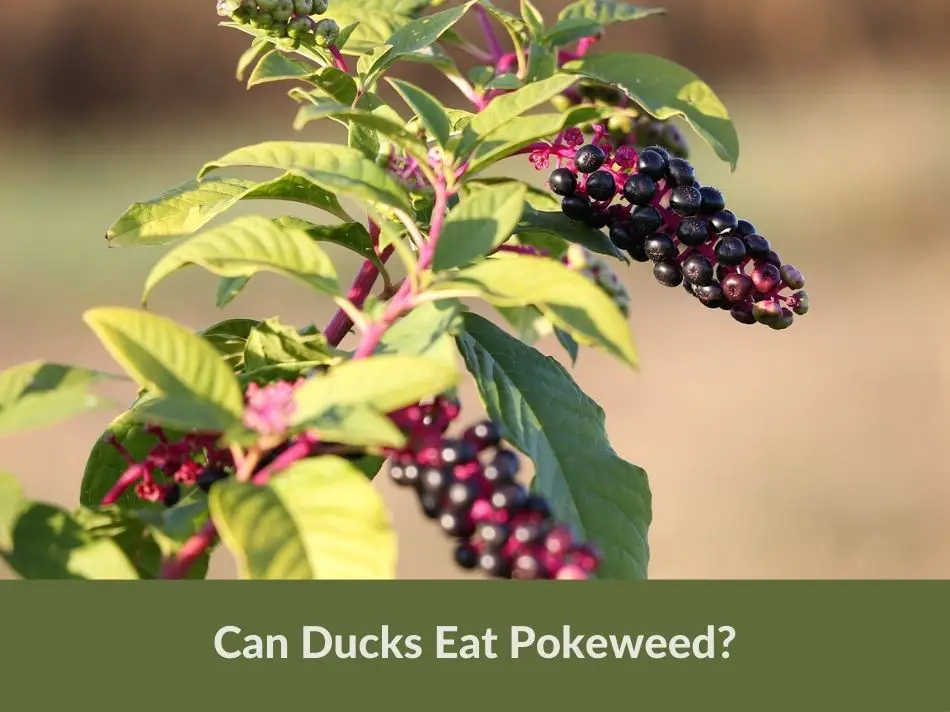If you are a duck owner or interested in the dietary habits of waterfowl, you’ve likely wondered what foods are safe for ducks to consume. Ducks have a natural inclination to forage for food, and sometimes they may stumble upon various plants and berries, like pokeweed. But, can ducks eat pokeweed?
No, ducks should not eat pokeweed because it contains phytolaccatoxin and phytolaccigenin, which are toxic to ducks.
In this article, we explore the safety of feeding pokeweed to ducks. A common wild plant, pokeweed is known for its toxicity, containing compounds harmful to both mammals and birds. We’ll delve into its nutritional content, outline the risks it poses to ducks, and provide signs of pokeweed poisoning to watch out for.
What is Pokeweed?
Pokeweed (Phytolacca americana) is a perennial herbaceous plant native to the eastern United States but also found in other parts of the world. The plant is known for its large, green leaves, clusters of dark purple berries, and bright red stems.
Although it is a common wild plant, pokeweed has a complicated reputation. While certain parts are consumed by humans after elaborate cooking processes that remove its toxins, it is generally considered poisonous, particularly the roots, seeds, and mature plants.
Is Pokeweed Healthy For Ducks?
Pokeweed is not a plant particularly rich in nutrients essential to ducks or other animals. While the berries contain carbohydrates and a small number of other compounds, these are not nutrients that ducks require in large quantities. Ducks primarily need a balanced diet consisting of grains, protein from insects, and a variety of vegetables and small amounts of fruits.
Toxicity of Pokeweed
The primary concern about pokeweed consumption is its toxicity. All parts of the plant, especially the roots, seeds, and mature stems and leaves, contain compounds such as phytolaccatoxin and phytolaccigenin, which are toxic to most mammals and birds.
These compounds can cause gastrointestinal distress, respiratory difficulties, convulsions, and in severe cases, death. Young pokeweed shoots are the least toxic but still contain harmful elements that should not be consumed without proper preparation.
Risks to Ducks
- Gastrointestinal Problems: Consuming even a small amount of pokeweed can lead to vomiting and diarrhea in ducks, causing dehydration.
- Respiratory Distress: Severe poisoning can lead to difficulty in breathing due to muscle weakness.
- Neurological Symptoms: Convulsions and changes in behavior may be noted if a duck consumes moderate to large amounts of pokeweed.
- Fatal Outcomes: In the worst-case scenario, a duck could die from pokeweed poisoning if it consumes a substantial amount, particularly of the roots or seeds.
Signs of Pokeweed Poisoning in Ducks
- Lethargy
- Vomiting
- Diarrhea
- Loss of appetite
- Coordination difficulties
- Respiratory distress
If you notice any of these symptoms, consult a veterinarian immediately. Rapid intervention is often crucial for survival.
Precautions for Duck Owners
- Identification and Removal: Learn how to identify pokeweed and remove it from areas where your ducks frequently roam.
- Educate Community: If your ducks are free-range, inform your neighbors about the risks of pokeweed.
- Check Foraging Areas: Regularly inspect areas where your ducks are likely to forage.
- Balanced Diet: Provide a balanced diet for your ducks so they are less likely to consume harmful plants out of nutrient deficiencies.
Other Berries Ducks Can Eat
Ducks have a diverse diet that includes a variety of plants and herbs, which can be beneficial for their health and well-being. Beyond the commonly known plants and herbs, there are several others that ducks can safely consume:
Make sure to check out our full list of flowers and plants that ducks can eat.
Conclusion
While ducks are opportunistic eaters that love to forage, pokeweed should not be on their menu. The plant contains toxic elements that pose severe health risks to ducks, ranging from gastrointestinal distress to fatal poisoning.
Duck owners and caregivers should exercise caution and ensure that their ducks’ environments are free of pokeweed and other toxic plants. By taking proactive measures, you can help keep these delightful birds healthy and happy.
Disclaimer: The information in this article is for informational purposes only. I'm not an expert or a veterinarian.


